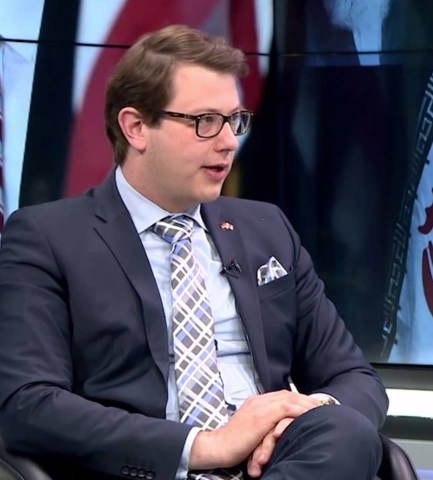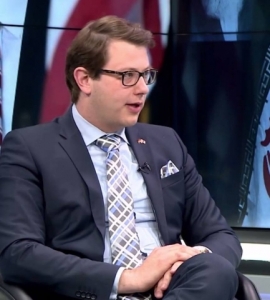Benjamin Fricke on Georgia’s Uncertain Future
Georgia at the Crossroads: An Uncertain Future – Benjamin Fricke pulled no punches when presenting his views during a public lecture at The Institute of World Politics (Washington DC) last month. As there is an acute shortage of international scholars that can deliver a viable, well thought out analysis (emphasis on adjectives) on Georgia, GEORGIA TODAY and Panorama TV show dully jumped at the chance to interview the German born scholar who is currently pying his trade as a Scientific Associate at Konrad-Adenauer-Stiftung's regional program in the South Caucasus.
Let’s discuss 1990s Georgia. What were the milestones and challenges since independence?
Coming from a country that was divided by a cold war as the consequence of WWII, I can draw a clear conclusion that Georgia by itself did a marvelous job in managing this transition from a soviet republic into an independent country. Of course, we have to understand the 90s as the wild period. There was a shortage of food, electricity, and even Tbilisi metro was closed. Georgia was knee-deep in corruption. We should not forget that in the Soviet Union there was a decentralized system in the republics- they were supposed to function themselves as one union. So, it was very tough for this country to transition itself into a self-sustaining economy. The “wild 90s” as we sometime call it were very hard for Georgians. But then again, I believe that it helped to form Georgia’s identity. And it is a time many Georgians do not want go back to. If I talk to Georgians younger than me and hear them say that Stalin was a good man and he did good things like winning WWII and building up the Soviet Union, then that most likely comes from that period of time because they had delusions in the 1990s and an urge to romanticize a period in which they, especially the older felt everything functioned and was organized better. But, obviously, the 90s meant hardship for people and that eventually led to the Rose revolution. I think Georgia’s difference compared to other Southern Caucasus countries was that it had an opportunity to actually manage a democratic revolution that changed the political and economic system of the country.
Going to the Rose revolution aftermath. Did Georgia develop in the right direction? There are critics who claim that Georgia is derailing itself from the democratic path and somehow moving towards the Russian pole
The Rose revolution was a breaking point in Georgian history. And compared to other countries like Armenia, Azerbaijan, Tajikistan or Kyrgyzstan, Georgia managed to get a party into power that reformed the country. It had a very dramatic police reform. It put anti-corruption measures in place which were extremely necessary to ensure a functioning infrastructure and administration. I always like to use example of that “mushroom building” – the Public Service hall. I don’t think I know any place in Germany where you can go and find everything under one roof. Everything is transparent. Because corruption is a disease in every functioning country. This is the first thing that needs to be fought. That was well done and needs to be continued.
But you asked whether Georgia is derailing right now. I do believe that there are some signs which should be looked at and they are a little bit worrisome. We’ve seen some stagnation in the will to reform. If you look at the current government of Georgia – it is not the right thing to have one person who has a lot of money running the government or pretty much pulling the strings behind the scenes. People really need to understand this. It’s the oligarchic system in Russia that has always broken Russian civil society’s neck. For Georgia, it is very important to keep a close eye on strengthening civil society and public involvement in government.
Let’s talk about Georgia’s Euro-Atlantic integration. How realistic and achievable are these aspirations?
If you look at Georgia’s engagement with NATO, over the years 11,000 Georgian troops have fought in Afghanistan, give or take. That’s an impressive number for a country the size of Georgia. Many politicians and reps of NATO and the EU very much appreciate this. They see Georgia’s commitment not only to NATO but also to fighting organized crime. The Georgian authorities have done a marvelous job in prosecuting them. And by looking at the visa liberalization, we can see that Georgia has been rewarded for this. Of course, the EU itself is a state in need of improvement. We have economic troubles in southern Europe, Brexit; we had recent elections in France, and we still have debt problems... So, the EU and its member states are very much absorbed with their domestic problems. All things considered, I think Georgia has been put back on the political map and it make sure it stays there.
Let’s play Eurosceptics for a moment - Montenegro never sent a single soldier to Afghanistan and got itself into the Alliance. How about Georgia then? Any double standards here?
Sometimes, I can’t follow the trend of thought which applies in these processes, either. The only thing I can say is of all countries that could potentially become an associate or a member of NATO and or the EU, Georgia has done its homework at the best.
So, Georgia deserves it?
I think by all standards Georgia would be the most appropriate candidate.
Georgia at a crossroads. What’s next for this country?
If you look at developments of the last months and years - it is at a pivotal point right now. We can even fall back and neglect reforms achieved in recent years because people are either not qualified to run the country, they have different intentions with regards where the country is going right now, or they are useful idiots for someone else. The Georgian public needs to live up to their democratic rights they have hard earned after 2003.
There is no consensus in Georgia regarding legal changes on selling of land to foreign citizens. Some members of the government think that the lands should be sold to foreigners with a view to develop agriculture and attract investments, amid concerns in society of such sale. What is your opinion?
I see why that would be a debating point. Property is to some extent responsibility but is also power. I think Georgians really need to come to terms themselves whether or not and under what conditions they are selling the land and to whom they are selling their land. I would not personally have a problem selling land to foreigners per se. Yet, checking someone who wants to buy land and to see the true intentions behind it as well as where money is coming from is essential in those cases to prevent corruption, money laundering or even a land grab. I’ve always been a proponent of private property rights and freedom of investment. Because after all this is the main backbone of the German economy with its middle-sized businesses, innovation and investments. On the other hand, it also depends on what any land buyer is trying to achieve. Georgia’s just signed a FTA with China. If you look at Chinese behavior in some African countries, that is also a new form of economic-colonialism. They brought their own workers, they built infrastructure to connect to the mines and ports. So they had the strategic infrastructure in the places they needed. And this is what they used the property for. Hardly anyone from the local population benefited from that expect for cheap products coming back to Africa and to some extend loans provided by the Chinese government. And it is mostly Chinese-backed companies that are doing exceptionally well. I think this really needs to be considered if you make a decision whether or not to sell your land or find alternatives such as a Hong Kong style land lease.
Could that happen in Georgia?
I’m sure such things can happen anywhere in a very similar way. I hope Georgians are aware of the experiences some African countries had. Because it was to some extent a new form of neo-colonialism and again is a different player who also may be in cahoots with Russia to some extent. I think Georgia has to be wary of this position globally and to pay attention what it sells to whom under which circumstances.
Vazha Tavberidze












